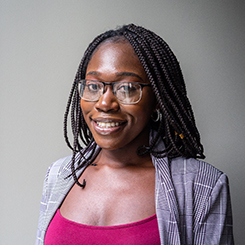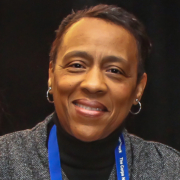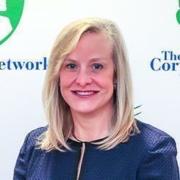

National Council of Young Leaders banner, painted by council member Francisco Garcia
Created in July 2012 in response to a recommendation from the White House Council on Community Solutions, the National Council of Young Leaders is tasked with informing policymakers, business leaders and funders about the issues faced by America’s young people. The 14 founding council members, ranging in age from 18 to 34, come from diverse upbringings in urban and rural low-income communities across the nation. They represent our country’s Opportunity Youth: the 6.7 million young Americans who are neither in school nor working, but who pose enormous potential for our economy and our future if they are provided the opportunity to get on track and get ahead. Though each council member has overcome different kinds of obstacles, they all share in common their participation in transformative youth programs that helped them become the successful young adults they are today.
In the fall of 2012, the Council released its first publication – Recommendations to Increase Opportunity and Decrease Poverty in America. The report outlines specific actions that could help Opportunity Youth and their communities. One of highlights of the publication is the Council’s Six Recommendations for Immediate Public Action: 1) Expand effective comprehensive programs; 2) Expand National Service; 3)Expand Private Internships; 4) Increase All Forms of Mentoring; 5) Protect and Expand Pathways to Higher Education; and 6) Reform the Criminal Justice System.
We wanted to hear the Council Members describe in their own words why these specific Recommendations are important to them and important to the success of America’s young people. Below, find out why council member Ramean Clowney is passionate about Recommendation #4…
Increase All forms of Mentoring:
End the pipeline to prison for children and youth, make sure punishments actually fit crimes, eliminate disparities in sentencing that correlate with race, and end the various forms of lifetime punishments for all offenders that destroy lives, families, and communities. Expand second chance and re-entry programs for all offenders. Expand mentoring programs and elevate both formal and informal mentoring as a core component for all programs serving opportunity youth. Young people need caring individual mentors to give us confidence, respect, and support in planning and working toward a productive future. We need mentors both from a similar background who have overcome familiar obstacles, and mentors from different backgrounds who can open whole new horizons.
[Recommendations to Increase Opportunity and Decrease Poverty in America, p. 8]
(Parts of Ramean’s bio and his photo were taken from the YouthBuild website)
“I consider myself to be someone whose been dealt a misfortunate hand in life, but I appreciate the hand that I was dealt because I worked through it and I’m happy with where I’m at now in my life. I was in DHS, I was in and out of high school. I was a dropout at  one point. At one point I thought my life was pretty much over. I thought I’d failed myself. Then I started working with people and I found a better path. I made my way out and I got back into school and I graduated with honors. Now I’m in the Community College of Philadelphia. With my story I’m able to sit on the Council and speak for young people that are in my shoes. I really consider myself a voice and an advocate for young people.”
one point. At one point I thought my life was pretty much over. I thought I’d failed myself. Then I started working with people and I found a better path. I made my way out and I got back into school and I graduated with honors. Now I’m in the Community College of Philadelphia. With my story I’m able to sit on the Council and speak for young people that are in my shoes. I really consider myself a voice and an advocate for young people.”
Ramean Clowney, 20, is from Philadelphia, PA. As a child, Ramean experienced the Pennsylvania foster care system and was exposed to violence, drugs and abuse. However, he overcame these hardships and eventually graduated from high school with honors.
Ramean is currently Chief Youth Ambassador for the Philadelphia Youth Network, one of the city’s leading youth programs, in this role, he is one of several advocates for local youth.
Currently a student at the Community College of Philadelphia, Ramean hopes to transfer to Howard University to pursue a bachelor’s degree (and eventually a master’s degree) in political science. He has also considered getting a doctoral degree. Ramean aspires to be on the Philadelphia City Council and maybe even run for mayor.
Why is this Recommendation important to you? Important to youth in general?
I believe that mentoring is important to not only young people, but to our elder’s as well because having somebody there for support is really moving. For people that don’t have nobody – that are in the world on their own, maybe an orphan who lost their parents to some incident – maybe they can find a mentor that can help and guide them if a family member can’t. A mentor is more than just someone who can be there; a mentor is somebody that steers you to the right path. If one person is a little lost, a mentor is someone that can somehow make sure they get on the right path.
Do you have any personal experience with mentors?
Yes I do. I met my mentor when I was about 16, being involved with the Philadelphia Youth Network. Kemal Nance. I didn’t recognize that he was a mentor to me until later on in my life when I realized I was seeing change in myself. He wasn’t pushing me to change, he was already doing change with me. It wasn’t like he was telling me, “you have to change this.” He was actually doing things to make me more professional – giving me work ethic, giving me skills that I can use in the work world to better my life.
I met another mentor basically around my senior year and when I entered college – Derrick Perkins. He started moving me up to the next level. He started helping me recognize what I needed to do, what goals I needed to set, what barriers might come my way. He was just there to actually support me.
What do you feel are the most important ways you were helped by your own mentors? What are the most important things you were able to gain from your mentors?
I can’t really figure out the right words to explain it now, but mainly it revolves around myself. I really found who I am and recognized the person that I am. I was able to narrow down to that person that is myself. A lot of time, young people have a tendency to get lost along the way. Sometimes it’s really hard for them to navigate themselves and pinpoint that true self because they’re lost, they don’t know who they are and they want to find themselves. I had the opportunity to be able to recognize who I am and use the skills that I had to better myself. So I guess you could say ‘recognition.’
What do you think is the role of a mentor? What should a good mentor do or be able to do?
A good mentor should at least be able to give good criticism. I think that’s the most crucial thing. I don’t think anyone should have a bougie mentor, as in they would be really nonchalant about everything their mentee does. I think a mentor should be someone that’s really straightforward – who’s not nice or mean, but really exemplifies the right emotion towards you to help you better yourself. I think a mentor’s main goal should be to support the young person, or whoever they’re mentoring, and be a guidance to them. Give them that support that they normally couldn’t find in a family member or somebody else that they’re close to at the time. To have the title of “mentor” to someone, they should be that inspiration so that a young person like me would be able to say, “That’s my mentor. He changed my life. He supported me when I didn’t support myself. He helped me recognize what I wanted to do. He helped me realize that anything in life is attainable with a little bit of work.”
Have you personally done any mentoring?
I believe that I’ve mentored with a lot of my peers. When I was just a really young teenager, around 14 or 15, I normally was in a group of people and I was always really friendly with a lot of people, but I never really led. I somewhat led, but I never really, fully led. Then I eventually started working with different programs and being trained by my mentor. At the time, I really didn’t know I was being trained and groomed into becoming a professional. A lot of my friends really looked to me for advice, really looked to me for support. I guided them to help them better themselves and find the right path.
Looking at the Recommendation, it says “we need mentors both from similar backgrounds who have overcome familiar obstacles, and mentors from different backgrounds…” What is the significance of this aspect of the Recommendation? Why is it important to have a diversity of mentors?
Well, I believe there’s nothing better than getting advice from someone with experience. I think that’s most effective. Like for a young person who just graduated from high school – normally they’d have their parents to guide them. Then they go away to college and they fail their entire first semester or entire first year. They weren’t used to being out on their own, they were used to being woken up on time, they were used to having somebody be there to guide them every step of the way. As far as someone to give advice, you don’t want someone who’s just going to say “I don’t think you should do this,” but someone who can say ‘I believe you should set your schedule this way, or work this way because that’s what would be best for you. You still want to be able to have fun, but you need to recognize that you’re not here to do A, B, C, and D. You’re here to get your education, and if you want to have fun then get your education first.” Hearing that would sound better from someone whose been there, because hearing advice sometimes, a person will ask “well, how would you know?” And the best support you can get is, “I’ve been there. I know. I’ve overcome that obstacle.” 
As far as someone that comes from a different background, that can be good, too. Because you can’t find one mentor to fit your exact background, but you can find people that have some knowledge of it. [Having a mentorship with people] from different backgrounds can also work because it’s a relationship that can grow. It’s a bond that can grow. You can learn things from each other, but you’ll still have that person there with that experience. I could be a peer mentor to someone that I’ve just met and whether we either come from similar or dissimilar backgrounds, there’s still a possibility that we can grow because the fact is that we have two different outlooks on things and maybe I can get positive advice and I can give him feedback if he can take criticism. But it all falls under how that mentor is. [You might have a] mentor that has a mindset that’s like, “You must achieve, you must succeed and you must go on and do this, this, this and this and you must work hard.” But if you have a mentor that has a mindset that’s like, “it’s okay, take your time, you’ll be okay,” then they’re not really advocating and trying to push that mentee to the best of his or her abilities.
What do you think needs to happen to make this Recommendation a reality? What can we do to increase the number of people involved in mentoring, whether formally or informally?
Often I hear people say, ‘I’m going to be mentor, I’m going to be a mentor to a young person.’ You can’t just think you can become a mentor to a young person because you say you want to become a mentor. There has to be a one-on-one connection for there to be growth. When I think about it, I believe the best kind of mentor comes maybe not indirectly, but maybe it’s a person that you’d least expect to be a mentor. I don’t know the experience of someone being in a mentoring program, but I don’t think they’re actually beneficial. That’s like someone saying, “I’m advocating and I’m going to be this child’s mentor and I’ll be this person’s Big Brother or Big Sister.” I don’t think a bond being forced is best. I don’t think it’s effective at all.
You think informal, “happen-on-their-own” mentorships are more valuable?
Yes. I do. I believe that for younger people, for the younger generation, a lot of times we – I’m only 20, so I’m partially still part of this group – we typically have this wall up. We have this kind of self-pride that we don’t need nobody. We have a lot of trust issues – maybe it comes from family, maybe it comes from past relationships. If we see that someone is trying to work their way in, we will set up a really, really strong barrier. So in that timeframe was that mentor actually effective? Was you being my mentor actually a help to me, because really this entire time I was not allowing you to help. If someone wants to have a good mentor, I believe they should seek one out in a way…maybe not go out and look for one, but just be able to recognize, “Okay, this is a nice person in heart and mind and has experience and education” or whatever it is that’s most important for that young person to consider them their mentor. I do know that from experience, having [different mentors] with and without and experience works best. You have people that advocate completely differently, but in the end still advocate for the same thing – to see you excel and help you see the things that you do wrong and what you do right. It’s what most people might see as a parent’s job, but that’s what a mentor can be; a parent.
I think it would be much easier if a young person finds somebody that actually wants to listen to them or actually wants to see them excel. A young person recognizes that. They can see that “This person really wants to help me. This person really wants to help me see what I can do and become better at what I do. This person acknowledges me.”


































































